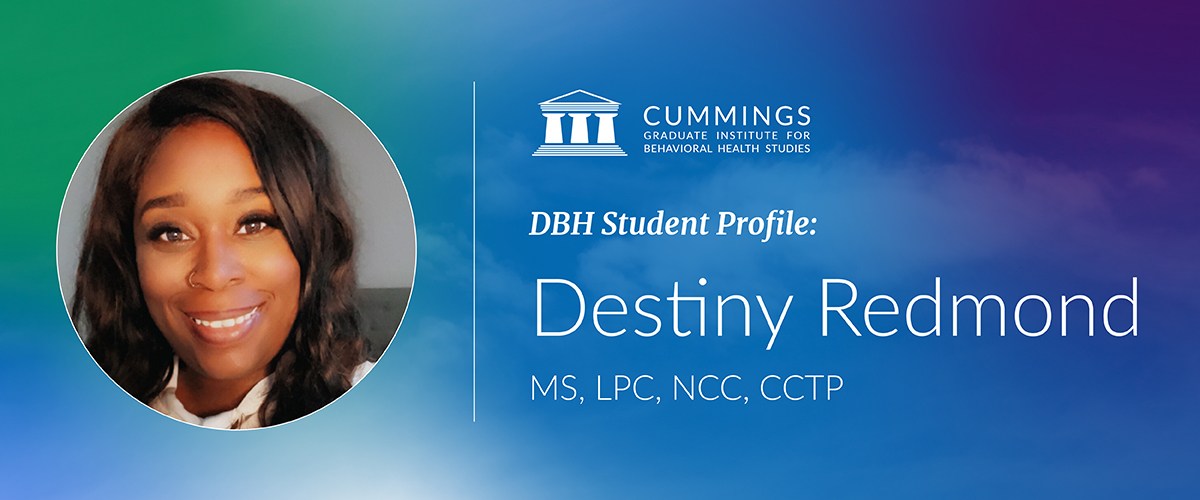 Mental Health Advocacy in Action: Destiny Redmond’s Trauma-Informed Approach for Underserved Communities
Mental Health Advocacy in Action: Destiny Redmond’s Trauma-Informed Approach for Underserved Communities
August 7, 2024
Destiny Redmond is a licensed professional counselor in the state of Georgia, telemental health provider for the state of Florida, and Doctor of Behavioral student at Cummings Graduate Institute for Behavioral Health Studies. Specializing in trauma-informed counseling and EMDR treatment, Destiny brings a profound understanding and compassionate approach to their practice. With five years of professional experience in a variety of settings, including inpatient, outpatient, residential community service, correctional facilities, and private practice, she offers a rich and informed perspective on mental health care. Her extensive background includes over seven years of advocacy for mental health, utilizing blogging and social media to disseminate critical tools and educational resources, specifically within the BIPOC community. Destiny takes pride in serving her community and working with people from all backgrounds, especially those from underserved communities. In this interview, she shares insights from her career and her vision for making an impact in the behavioral health field.
How are you actively contributing to or impacting your local community through your behavioral health expertise?
I contribute to my community by providing trauma-informed counseling and EMDR treatment to those in underserved populations. Being a part of a community of diverse individuals, Growing up in a predominantly black city, I have witnessed and experienced being among those suffering from severe traumatic experiences that continue to impact their daily lives. Knowing the deficits in mental health care, my desire to advocate and provide care starts right at home.
What aspect of your professional experience has influenced your approach to behavioral health?
My approach to behavioral health has been impacted by the diverse cultural backgrounds and experiences we all share as humans. Working with many populations of diverse individuals during my early time as a mental health professional helped me to understand what factors for risk in one person may be different in another from different backgrounds.
What challenges have you encountered in the behavioral health field, and how do you envision overcoming similar challenges in the future?
Something that I have specifically seen as a challenge within the behavioral health field is access to care. While virtual has played a pivotal role with helping patients and clients access their health care needs. I know that many who seek mental health care are also dealing with various health and systemic problems that also affect their overall mental health wellness. So with the knowledge I continue to learn throughout the DBH program, I am able to not only understand more in depth problems my clients may bring into session but I can now make the necessary referrals and provide additional resources to enhance mental health treatment.
Can you highlight a situation that has significantly influenced your understanding of integrated care and behavioral health?
What’s been most influential in shaping my understanding of integrated care and behavioral health is my ability to work in an integrative environment and having interactions with medical providers and psychiatric providers. These experiences working with both medical and psychiatric staff, have helped me understand how much of an impact and asset mental health professionals are in the field and how the body and mind are all one.
How do you see yourself making a lasting impact in behavioral health?
I see myself making a lasting impact by not only striving to provide quality mental health care, but inspiring, empowering and educating underserved communities about comorbid conditionals that also impact mental health and the resources and tools available to improve their overall wellness.
Destiny’s career and educational journey are driven by her profound commitment to serving her community and addressing the unique challenges of underserved populations. Growing up in a predominantly Black city, she witnessed the impact of severe trauma and mental health care deficits, which fuels her advocacy for mental health, particularly within the BIPOC community. Through social media and direct care, Destiny actively promotes mental health awareness. Her education in the DBH program strengthens her capacity to make informed referrals and offer additional resources. Dedicated to empowering underserved communities, Destiny aims to inspire positive change and advocate for accessible, quality holistic healthcare for all.
Learn about an impactful moment in Destiny’s career
Connect with Destiny Redmond
Instagram: @myfearlessdestiny
Facebook: Therapy with Destiny
LinkedIn: Destiny Redmond
Therapy with Destiny: www.therapywithdestiny.com
Explore Destiny Redmond’s Research
Mentally Ill and Incarcerated: A Literature Review of Illness Severity in BIPOC Populations
Incarcerated individuals from BIPOC populations or Biracial, Indigenous and people of color make up a significant amount of the correction population. According to the National Association for the Advancement of Colored People criminal fact sheet, thirty-four percent of people of color make up the United States population, while fifty-six percent of the incarceration population is made up of African Americans and Hispanic people (2022). Therefore, the data shows that a disproportionate population represents correctional facilities. The mentally ill also make up a disproportionate number of incarcerated individuals (Held et al., 2012). Reviewing this collective data can assist researchers in understanding the scale of the issues among BIPOC populations, specifically people of color with mental illness.






























